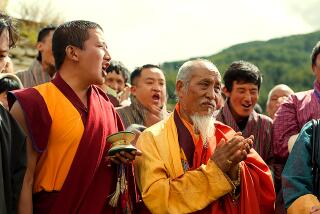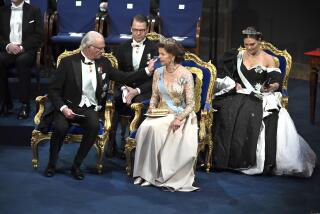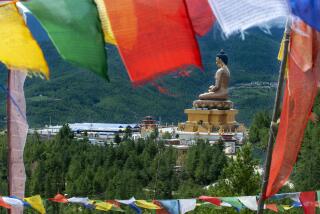Bhutanese King Modernizes With Caution
THIMPHU, Bhutan — Bhutanese consider Jigme Singye Wangchuck to be a people’s king, yet he has absolute power.
He’s his own prime minister, controlling a government of technocrats. The National Assembly has lively debates, but the king sets the nation’s agenda because there is no democracy in Bhutan.
The king’s goal is to cautiously modernize the once-feudal nation while protecting its Buddhist culture and pristine environment from foreign influences.
His Majesty--no one refers to him by his name--is the fourth in a dynasty to rule Bhutan since 1907. After generations of conflict between warlords, his great-grandfather was elected by an assembly of Buddhist monks, civil servants and nobles. Since then, the monarchy has been hereditary.
The king understands the limits of monarchy. “We cannot depend in the future on the hope that we will have a wise king,” he was quoted as saying several years ago. “Therefore, I have always emphasized the importance of decentralization of government.”
Local and district councils, whose members are chosen by consensus, allow ordinary people a say in running local affairs. Two-thirds of the 150-member National Assembly in the capital, Thimphu, are elected by these local bodies, and one-third are appointed by either the king or the clergy.
The king--known as the Druk Gyalpo, or “precious ruler of the dragon people”--took the throne in 1972 at age 17. Even today, some of his portraits hanging in stores, offices and homes show the youthful monarch with a floppy Beatles-style haircut and bushy sideburns.
He married four sisters--a common practice in Bhutan, where property is inherited by daughters rather than sons and families prefer to keep sisters together to avoid dividing the heritage.
How does one talk to a monarch with 10 children about family planning? U.S. Health and Human Services Secretary Donna Shalala, who did just that, says “he handled it very well.”
“He said he’s told his people that he is not a role model,” she told the Associated Press.
The king has forsworn the family palace where his mother lives. Home is a simple log cottage. The four queens live separately in a nearby compound, and he sees them and his children often. Crown Prince Jigme Khesar Namgyal Wangchuck is studying at a prep school in the United States.
The king borrows his mother’s palace to entertain foreign guests at state functions. He welcomes visitors himself at the door to his unadorned office in a 17th century fortress.
At 42, he’s a devoted basketball fan, but doesn’t play much anymore. Until a few years ago, he would bring in a team of soldiers to play students of the Royal Institute of Management.
Tennis and golf are the king’s current pastimes. But barring his trips to the countryside, he seems to have become more reclusive in recent years.
Although he studied briefly in England and speaks flawless English, he refuses to go abroad except to attend an annual summit of South Asian countries. Usually, he says, foreign travel is a waste of time.
More to Read
Sign up for Essential California
The most important California stories and recommendations in your inbox every morning.
You may occasionally receive promotional content from the Los Angeles Times.










